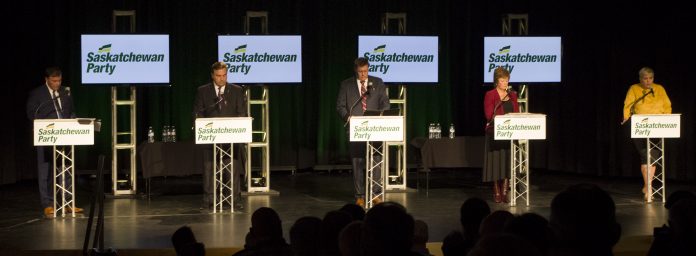
The strength of the Saskatchewan Party has traditionally been in rural areas, but if Thursday’s debate in Melfort is any indication, success in the next election will depend on the cities.
Of the five candidates who took part Thursday’s debate, three used their closing statements to emphasize the importance of appealing to voters in the province’s major urban centres.
Tina Beaudry-Mellor, Ken Cheveldayoff and Gord Wyant all raised concerns about the party’s ability to win outside of its traditional strongholds, with some suggesting it was the defining issue of the campaign
“We all remember 2003. Our party won all but one rural seat, and we won three seats in Saskatoon, but we lost to the NDP,” Cheveldayoff said during his closing remarks. “Folks, we have deep rural roots. Farms, villages and towns are still the backbone of our province, but if we are unable to win in Regina and Saskatoon and Moose Jaw and Prince Albert, none of that will matter.”
“Our party success in three consecutive elections has been because of pragmatic policies that appeal to both rural and urban voters,” said Wyant during his own one-minute message. “On January 27th, we need to chose a leader who can keep the coalition strong, who can keep the tent open and keep the base broad.”
Concerns among leadership candidates about the party’s ability to win votes in urban constituencies have only grown after a pair of by-election losses in Saskatoon. NDP leadership candidate Ryan Meili beat Sask. Party nominee Brent Penner by more than 700 votes in the March 14 Saskatoon Meewasin by-election. More recently, the NDP’s Vicki Mowat defeated Sask. Party candidate Cameron Scott by more than 1,000 votes in Saskatoon Fairview on Sept. 19.
For candidates like Beaudry-Mellor, the message was clear.
“It means that some of our supporters in urban Saskatchewan are staying home,” she said during her closing remarks. “Your next premier needs to turn that momentum around, and part of that is maintaining the sort of coalition, or dual values, of economic growth and quality of life issues that our party has been known for.”
However, not all candidates are sold on the rural-urban divide. Alanna Koch used her closing remarks to urge the party to stay the course and build on what was started over the past decade. Afterwards, Koch said she doesn’t see as much of a provincial divide as her colleagues do.
“I see Saskatchewan people as the same,” she said. “We’ve got the same values (and) the same things matter to us: families, jobs, a strong economy (and) a great quality of life. I don’t really see the difference. I do know that I’ve got all kinds of traction in both the cities as well as the rural areas, and I’m not surprised by that because we’re all the same.”
Rosthern-Shellbrook MLA Scott Moe also used his one-minute closing statement to focus on other areas. He spoke about the need for experience and strong leadership in the next general election.
However, after the debate Moe, the only rural MLA in the party’s leadership race, didn’t hesitate to emphasize the importance of staying competitive in Saskatchewan’s cities.
“I think we need to work hard. I think we need to work harder than the NDP, quite frankly,” he said. “That’s precisely what we did in 2007, ’11 and most recently in 2016, and I think all of the candidates, myself included, are very willing to do that as we go into the general election.”
Identifying a problem is one thing, but putting forward a solution is another. While Beaudry-Mellor, Cheveldayoff and Wyant all have similar concerns about the future, their plans for the present are a bit different.
Cheveldayoff said the last 10 years have seen a lot of economic growth, but after a difficult spring budget the party needs to step back and admit some mistakes were made.
Wyant wants the party to focus on the things that unite voters, like improving the efficiency and effectiveness of government, without creating divisions within the province.
Beaudry-Mellor said they need to emphasize how the health of the agricultural and natural resource sector affect the quality of life in all areas of the province, including Saskatchewan cities.
Of the 10 seats not won by the Saskatchewan Party in the 2016 provincial election, eight were in Saskatoon, Regina or Prince Albert. Only two were in rural areas. Both of those rural ridings are in Northern Saskatchewan.
Cabinet minister Joe Hargrave said there has always been talk of an urban-rural divide in Saskatchewan politics. However, the Saskatchewan Party’s lone Prince Albert MLA said he doesn’t believe a significant split exists.
Hargrave, who is one of more than a dozen urban Saskatchewan Party MLAs, said it’s an important issue to talk about, given that the government needs to represent the whole province. Still, he thinks the party is already having lots of success, and just needs to stick to its current plan.
“I don’t think we need any major shift in any policies to continue to be successful in the cities and the urban centres,” he said. “You’ve got to remember, we still have the vast majority of seats, both rural and urban, so we’ve done very, very well in the cities, and I just think we’ve got to continue to listen to those people.”

